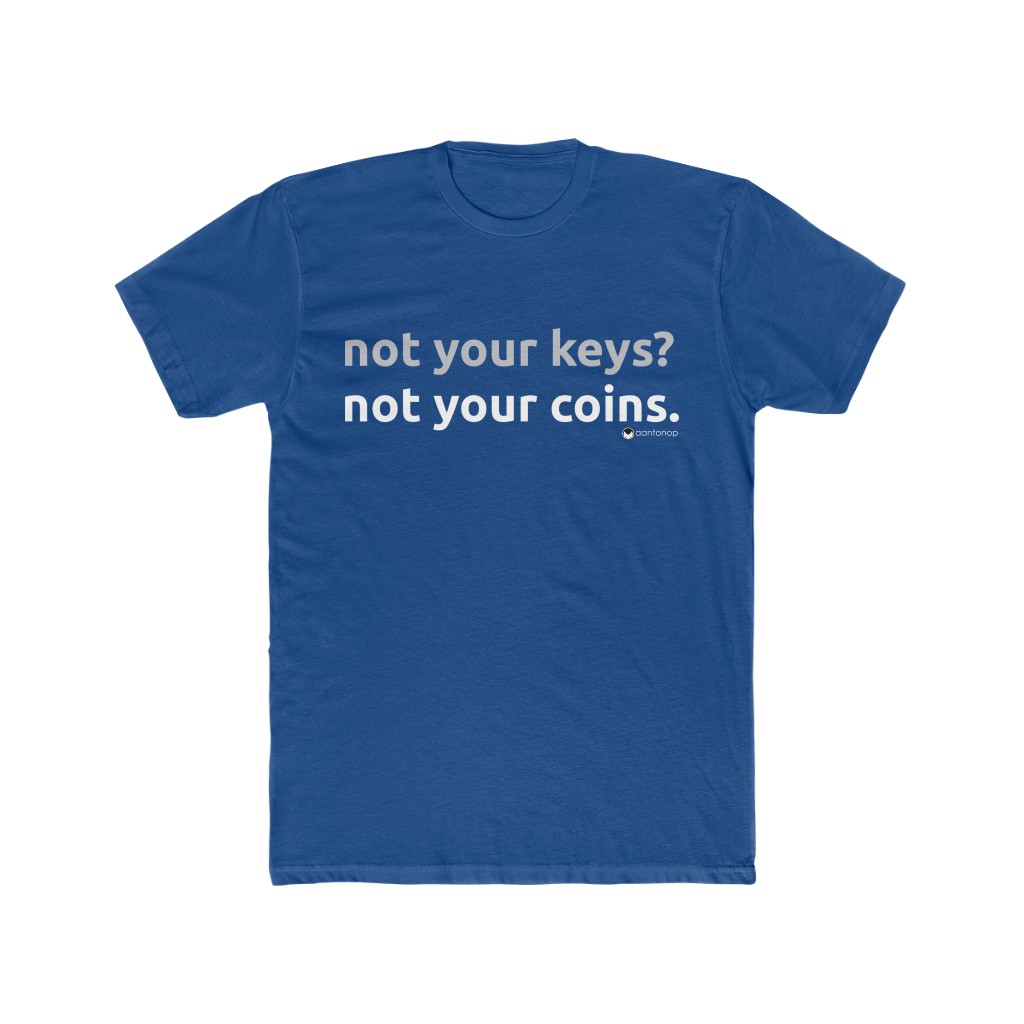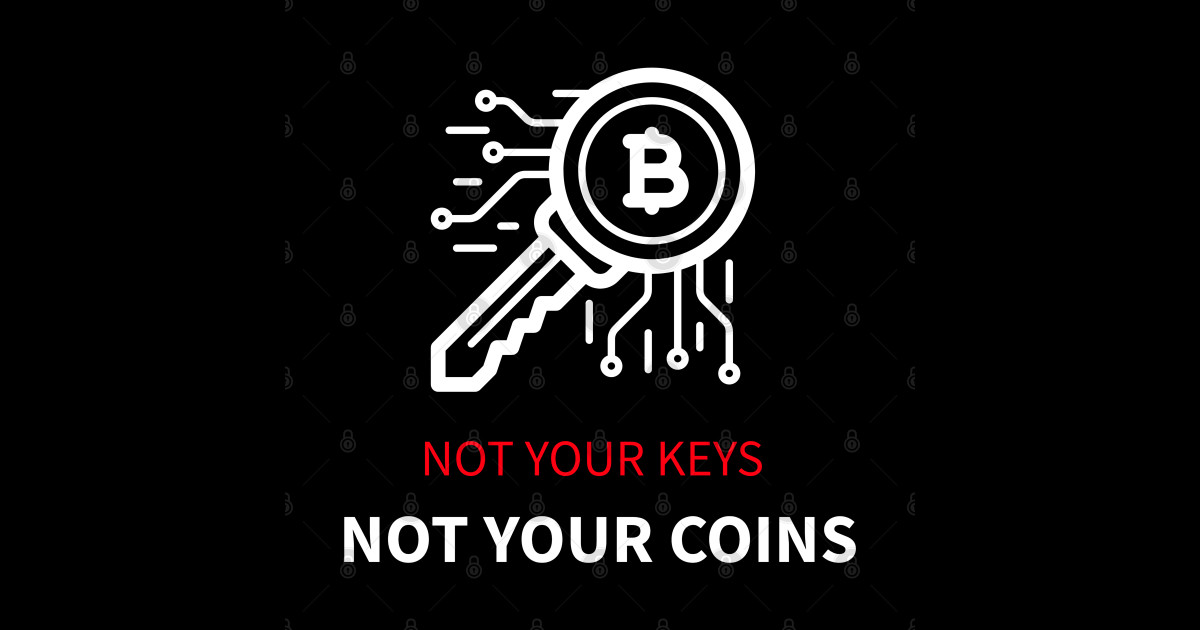Key Concept: Not Your Keys, Not Your Coins
Not your keys not your coins - In the realm of cryptocurrency, ownership and control over digital assets are inextricably linked to the possession of private keys. This fundamental principle, encapsulated by the maxim "Not Your Keys, Not Your Coins," underscores the critical importance of safeguarding these keys to ensure the security and integrity of one's cryptocurrency holdings.
Find out about how cvx crypto can deliver the best answers for your issues.
Private keys, often represented as complex strings of alphanumeric characters, serve as the cryptographic gatekeepers to cryptocurrency wallets. They empower users with the exclusive ability to access, transfer, and manage their digital assets. Without possession of the private key, individuals are essentially locked out of their cryptocurrency accounts, rendering their holdings inaccessible and vulnerable to theft or loss.
Investigate the pros of accepting bingx exchange in your business strategies.
Significance of Private Keys
- Exclusive Control: Private keys grant users absolute control over their cryptocurrency holdings, enabling them to execute transactions and manage their assets as they deem fit.
- Security Foundation: Private keys form the bedrock of cryptocurrency security. They safeguard digital assets from unauthorized access and protect against theft or malicious activity.
- Irrecoverable Loss: Unlike traditional banking systems, there is no central authority to assist in recovering lost or stolen private keys. Losing access to a private key can result in permanent loss of the associated cryptocurrency.
Centralized vs. Decentralized Custody
Centralized and decentralized custody are two contrasting approaches to storing cryptocurrencies. Centralized exchanges, such as Binance or Coinbase, hold users' cryptocurrencies in a single location, while decentralized wallets, such as MetaMask or Ledger, give users complete control over their private keys and assets. Centralized exchanges offer several advantages. They are generally more user-friendly and convenient, as users can easily buy, sell, and trade cryptocurrencies without having to manage their own private keys. Additionally, centralized exchanges often provide additional features, such as margin trading and staking, that are not available with decentralized wallets. However, centralized exchanges also come with some security risks. Because they hold users' cryptocurrencies in a single location, they are vulnerable to hacking and theft. In the event of a security breach, users could lose all of their assets. Additionally, centralized exchanges have the ability to freeze or confiscate users' funds, which could pose a risk to users in certain jurisdictions. Decentralized wallets, on the other hand, give users complete control over their private keys and assets. This means that users are responsible for managing their own security, but it also means that they are not subject to the same security risks as centralized exchanges. In the event of a security breach, users' funds are not at risk, as they are not stored in a single location. However, decentralized wallets can be more complex to use than centralized exchanges, and they require users to have a good understanding of cryptocurrency security. Additionally, decentralized wallets do not offer the same features as centralized exchanges, such as margin trading and staking. Ultimately, the best choice between centralized and decentralized custody depends on the individual user's needs and risk tolerance. Users who value convenience and ease of use may prefer centralized exchanges, while users who prioritize security and control may prefer decentralized wallets.Advantages of Centralized Exchanges
- User-friendly and convenient
- Offer additional features, such as margin trading and staking
- Provide customer support
Disadvantages of Centralized Exchanges
- Vulnerable to hacking and theft
- Can freeze or confiscate users' funds
- May not be available in all jurisdictions
Advantages of Decentralized Wallets
- Complete control over private keys and assets
- Not vulnerable to hacking or theft
- Cannot freeze or confiscate users' funds
Disadvantages of Decentralized Wallets
- Can be complex to use
- Do not offer the same features as centralized exchanges
- Users are responsible for their own security
Security Best Practices: Not Your Keys Not Your Coins
 Cryptocurrency wallets are essential for storing and managing digital assets. Implementing robust security measures is crucial to protect your funds from unauthorized access and theft. Here are some best practices to enhance the security of your cryptocurrency wallets:
Cryptocurrency wallets are essential for storing and managing digital assets. Implementing robust security measures is crucial to protect your funds from unauthorized access and theft. Here are some best practices to enhance the security of your cryptocurrency wallets: Creating and Managing Secure Cryptocurrency Wallets
- Use reputable and well-established wallet providers. - Choose wallets that offer multiple layers of security, such as strong encryption, two-factor authentication, and hardware wallet integration. - Regularly update your wallet software to ensure you have the latest security patches. - Store your wallet's seed phrase or private keys securely, preferably offline in a safe location.Strong Passwords and Two-Factor Authentication
- Create strong and unique passwords for all your cryptocurrency accounts. - Use a password manager to generate and store complex passwords securely. - Enable two-factor authentication (2FA) on all your accounts to add an extra layer of protection against unauthorized access.Hardware Wallets
- Consider using hardware wallets for storing large amounts of cryptocurrency. - Hardware wallets are physical devices that store your private keys offline, providing enhanced security against online attacks. - Choose reputable hardware wallet manufacturers and follow best practices for their use, such as storing them in a secure location and keeping their firmware up to date.Common Security Threats and Vulnerabilities, Not your keys not your coins
- Be aware of phishing scams that attempt to trick you into revealing your private keys or seed phrase. - Avoid downloading suspicious software or clicking on links from unknown sources. - Keep your operating system and antivirus software up to date to protect against malware and other security threats. - Monitor your cryptocurrency transactions regularly for any suspicious activity.Case Studies and Examples

The adage "not your keys, not your coins" is a stark reminder of the importance of taking ownership of your cryptocurrency and safeguarding your private keys. Numerous real-world examples underscore the consequences of poor security practices and highlight the need for vigilance in protecting your digital assets.
One notable case involved a Reddit user who lost over $200,000 in Bitcoin after falling victim to a phishing scam. The user clicked on a malicious link that prompted them to enter their private keys, which allowed the scammers to access and steal their funds.
Consequences of Not Taking Ownership of Private Keys
- Loss of Control: When you don't control your private keys, you relinquish ownership of your cryptocurrency and trust a third party to safeguard it.
- Vulnerability to Hacks and Scams: Centralized custodians can become targets for hackers and scammers, potentially exposing your assets to theft.
- Limited Access and Flexibility: With centralized custody, you may face restrictions on accessing your funds, such as withdrawal limits or delays.
Implications for Cryptocurrency Adoption

The "Not Your Keys, Not Your Coins" principle has significant implications for the mainstream adoption of cryptocurrencies. It raises questions about trust, regulation, and the future of digital asset ownership.
One major implication is that it emphasizes the importance of personal responsibility in cryptocurrency management. Users who store their coins on centralized exchanges or custodial services are essentially trusting a third party with their assets. While these services may offer convenience and ease of use, they also introduce a potential point of failure or compromise.
Trust and Regulation
The "Not Your Keys, Not Your Coins" principle highlights the need for increased trust and regulation in the cryptocurrency industry. As more people adopt cryptocurrencies, it is crucial to establish clear rules and guidelines to protect users and ensure the integrity of the ecosystem.
Regulators worldwide are grappling with the challenges of regulating cryptocurrencies. The decentralized nature of these assets makes it difficult to apply traditional regulatory frameworks. However, there is a growing recognition of the need for regulation to protect consumers and prevent illicit activities.
Future of Digital Asset Ownership
The "Not Your Keys, Not Your Coins" principle has the potential to shape the future of digital asset ownership. It could lead to a shift towards greater decentralization, with users taking more control over their own assets.
The development of decentralized exchanges (DEXs) and self-custodial wallets is a testament to this trend. DEXs allow users to trade cryptocurrencies directly with each other, without the need for a centralized intermediary. Self-custodial wallets give users complete control over their private keys and the ability to store their assets securely offline.
Obtain access to crypto com visa card to private resources that are additional.
